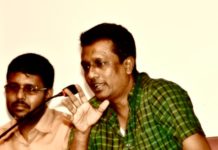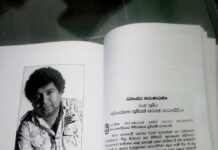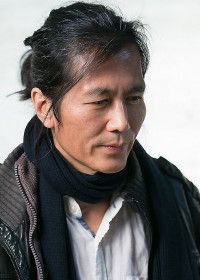”While educated society loses interest in honest, illegal literature, there is a passionate aspiration among workers to knowledge and to socialism; the real heroes emerge from amongst workers who, — regardless of disgraceful situation in their lives, despite enfeebling and backbreaking labor at a factory, — find quite much of character and willpower within themselves to learn, learn, and learn, and to develop conscious social democrats from themselves, to become the “working intelligentsia”.
Lenin.
XXXXXXXXXX XXXXXXXXXX XXXXXXXXXXXXX XXXXXXX
The coronavirus epidemic confronts us with two opposed figures that prevail in our daily lives: those who are overworked to exhaustion (medical stuff, caretakers…) and those who have nothing to do since they are forcibly or voluntarily confined to their homes. Belonging to the second category, I feel obliged to use this predicament to propose a short reflection on different ways in which we can be tired. I will ignore here the obvious paradox of the enforced inactivity itself making us tired, so let me begin with Byung-Chul Han who provided a systematic account of how and why we live in a “burnout society.”[i] Here is a short resume of Byung-Chul Han’s masterpiece shamelessly taken from Wikipedia:
“Driven by the demand to persevere and not to fail, as well as by the ambition of efficiency, we become committers and sacrificers at the same time and enter a swirl of demarcation, self-exploitation and collapse. ‘When production is immaterial, everyone already owns the means of production him- or herself. The neoliberal system is no longer a class system in the proper sense. It does not consist of classes that display mutual antagonism. This is what accounts for the system’s stability.’ Han argues that subjects become self-exploiters: ‘Today, everyone is an auto-exploiting labourer in his or her own enterprise. People are now master and slave in one. Even class struggle has transformed into an inner struggle against oneself.’ Individuals has become what Han calls ‘the achievement-subjects’; they do not believe they are subjugated ‘subjects’ but rather ‘projects: Always refashioning and reinventing ourselves’ which ‘amounts to a form of compulsion and constraint – indeed, to a more efficient kind of subjectivation and subjugation. As a project deeming itself free of external and alien limitations, the I is now subjugating itself to internal limitations and self-constraints, which are taking the form of compulsive achievement and optimization.’”
While Han offers perspicuous observations on the new mode of subjectivation from which we can learn a lot – what he discerns is today’s figure of the superego [Social Authority] -, one should note that the new form of subjectivity described by Han is conditioned by the new phase of global capitalism, which remains a class system with growing inequalities. Struggle and antagonisms are in no way reducible to the intra-personal “struggle against oneself.” There are still millions of manual workers in Third World countries, just as there are big differences between different kinds of immaterial workers (suffice it to mention the growing domain of “human services” like the caretakers of old people). A gap separates the top manager who owns or runs a company from a precarious worker spending days at home alone with his/her PC: they are definitely not both a master and a slave in the same sense.
A lot is being written on how the old Fordist assembly line mode of work is replaced by a new mode of creative cooperative work that leaves much more space for individual creativity. Nonetheless, what is effectively going on is not so much a replacement but an outsourcing: work at Microsoft and Apple may be organized in a more cooperative way, but final products are then put together in China or Indonesia in a very Fordist way. Assembly line work is simply outsourced. So, we get a new division of work: self-employed and self-exploited workers (described by Han) in the developed West, assembly line debilitating work in the Third World, plus the growing domain of human care workers in all its forms (caretakers, waiters…) where exploitation also abounds. Only the first group (self-employed, often precarious workers) fits Han’s description.[Gap]
Each of the three groups implies a specific mode of being tired and overworked. Assembly line work is simply debilitating in its repetitiveness. You get desperately tired of assembling again and again the same iPhone behind a table at a Foxconn factory in a suburb of Shanghai. In contrast to this tiredness, what makes human care work so tiresome is the very fact that you are (also) paid to pretend to do your work with true affection, that you really care about your “objects” of work. A kindergarten worker is paid also to show sincere affection for children, and the same goes for those who take care for old retired persons. Can one imagine the strain of “being nice” on and on? In contrast to the first two spheres where at least we can maintain some kind of inner distance towards what we are doing (even when we are expected to treat a child nicely, we can just pretend to do it), the third sphere demands of us something which is much more tiresome. Imagine I am hired to elaborate how to publicize or package a product in order to seduce people to buy it. Even if I personally don’t care about this or even hate the idea, I have to engage quite intensely with what one cannot but awaken my creativity, trying to figure out original solutions. And such an effort can exhaust me much more than boring repetitive assembly line work: this is the specific tiredness Han is talking about.
And, last but not least, we should avoid the temptation to condemn strict self-discipline and dedication to work and propagate the stance of “Just take it easy!” Arbeit macht frei! is still the right motto, although it was brutally misused by the Nazis. So, to conclude with the ongoing pandemic: yes, there is hard exhaustive work for many who deal with its effects, but it is a meaningful work for the benefit of the community, which brings its own satisfaction, not the stupid effort to succeed on the market. When a medical worker gets deadly tired from working overtime, when a caretaker is exhausted, they are tired in a way that is totally different from the exhaustion of being obsessed with career moves.
Here is how my friend Andreas Rosenfelder, a German journalist from Die Welt, described the new stance towards daily life that is emerging: “I really can feel something heroic about this new ethics, also in journalism – everybody works day and night from home office, making video conferences and taking care of children or schooling them at the same time, but nobody asks why he or she is doing it, because it’s not any more ‘I get money and can go to vacation etc.’, since nobody knows if there will be vacations again and if there will be money. It’s the idea of a world where you have a flat, basics like food etc., the love of others and a task that really matters, now more than ever. The idea that one needs ‘more’ seems unreal now.” I cannot imagine a better description of what one should call a non-alienated decent life.
Slavoj Žižek
Notes:
[i] Byung-Chul Han, The Burnout Society, Redwood City: Stanford UP 2015.
Reply From Byung-Chul Han
But the virus doesn’t only make Covid sufferers tired. It is now making even healthy people tired. In his book Pandemic! Covid-19 Shakes the World, Slavoj Žižek dedicates a whole chapter to the question “Why are we tired all the time?” Žižek clearly also senses that the pandemic has made us tired. In this chapter, Žižek takes issue with my book The Burnout Society, arguing that exploitation by others has not been replaced by self-exploitation but has only been relocated to Third World countries.
I agree with Žižek that this relocation has taken place. The Burnout Society mainly concerns Western neoliberal societies and not the situation of the Chinese factory worker. But through social media the neoliberal form of life is also expanding across the Third World. The rise of egotism, atomization, and narcissism in society is a global phenomenon. Social media turns all of us into producers, entrepreneurs whose selves are the businesses. It globalizes the ego culture that erodes community, erodes anything social. We produce ourselves and put ourselves on permanent display. This self-production, this ongoing “being-on-display” of the ego, makes us tired and depressed. Žižek does not address this fundamental tiredness, which is characteristic of our present times and has been aggravated by the pandemic.
Žižek appears in one passage of his pandemic book to warm to the thesis of self-exploitation, writing, “They [people working from home] may gain even more time to ‘exploit ourselves’ [sic].” During the pandemic, the neoliberal labor camp has acquired a new name: the home office. Work at the home office is more tiring than work at the office. However, this cannot be explained in terms of increased self-exploitation. What is tiring is the solitude involved, the endless sitting in one’s pajamas in front of the screen. We are confronted with our selves, compelled constantly to brood over and speculate about ourselves. Fundamental tiredness is ultimately a kind of ego tiredness. The home office intensifies it by entangling us even deeper in our selves. Other people, who could distract us from our ego, are missing. We tire because of the lack of social contact, of hugs, of bodily touch. Under quarantine conditions we begin to realize that perhaps other people are not “hell,” as Sartre wrote in No Exit, but healing. The virus also accelerates the disappearance of the other that I have described in The Expulsion of the Other.
An absence of ritual is another reason for the tiredness induced by the home office. In the name of flexibility, we are losing the fixed temporal structures and architectures that stabilize and invigorate life. The absence of rhythm, in particular, intensifies depression. Ritual creates community without communication, whereas today what prevails is communication without community. Even those rituals that we still had, such as football matches, concerts, and going out to the restaurant, theater, or cinema, have been canceled. Without greeting rituals, we are thrown back upon ourselves. Being able to greet someone cordially makes one’s self less of a burden. Social distancing dismantles social life. It makes us tired. Other people are reduced to potential carriers of the virus from whom physical distance must be maintained. The virus amplifies our present crises. It is destroying community, which was already in crisis. It alienates us from each other. It makes us even lonelier than we already were in this age of social media that reduce the social and isolate us.
Culture was the first thing to be abandoned during lockdown. What is culture? It engenders community! Without it, we come to resemble animals that want merely to survive. It is not the economy but most of all culture, namely communal life, that needs to recover from this crisis as soon as possible.
Constant Zoom meetings also make us tired. They turn us into Zoom zombies. They force us permanently to look into the mirror. Looking at your own face on the screen is tiring. We are continuously confronted with our own faces. Ironically, the virus appeared precisely at the time of the selfie, a fashion that can be explained as resulting from the narcissism of our society. The virus intensifies this narcissism. During the pandemic, we are all constantly confronted by our own faces; we produce a kind of never-ending selfie in front of our screens. That makes us tired.
Zoom narcissism produces peculiar side effects. It has led to a boom in cosmetic surgery. Distorted or blurred images on the screen lead people to despair over their appearance, while if the screen’s resolution happens to be good, we suddenly detect wrinkles, baldness, liver spots, bags under our eyes, or other unattractive skin imperfections. Since the beginning of the pandemic Google searches for cosmetic surgery have soared. During lockdown, cosmetic surgeons have been swamped with enquiries from customers seeking to improve their tired appearance. There is even talk of a “Zoom dysmorphia.” The digital mirror encourages this dysmorphia (an exaggerated concern with supposed flaws in one’s physical appearance). The virus pushes the frenzy of optimization, which already had us in its grip prior to the pandemic, to the limit. Here, too, the virus holds up a mirror to our society. And in the case of Zoom dysmorphia, the mirror is a real one! Pure despair over our own looks rises up in us. Zoom dysmorphia, this pathological concern with our egos, also makes us tired.
The pandemic has also revealed the negative side effects of digitalization. Digital communication is a very one-sided, attenuated affair: There is no gaze, no body. It lacks the physical presence of the other. The pandemic is ensuring that this essentially inhuman form of communication will become the norm. Digital communication makes us very, very tired. It is a communication without resonance, a communication devoid of happiness. At a Zoom meeting we cannot, for technical reasons, look each other in the eyes. All we do is stare at the screen. The absence of the other’s gaze makes us tired. The pandemic will hopefully make us realize that the physical presence of another person is something that brings happiness, that language implies physical experience, that a successful dialogue presupposes bodies, that we are physical creatures. The rituals we have been missing out on during the pandemic also imply physical experience. They represent forms of physical communication that create community and therefore bring happiness. Most of all, they lead us away from our egos. In the present situation, ritual would be an antidote for fundamental tiredness. A physical aspect is also inherent in community as such. Digitalization weakens community cohesion insofar as it has a disembodying effect. The virus alienates us from the body.
The mania for health was already rampant before the pandemic. Now, we are mainly concerned with survival, as if we were in a permanent state of war. In the battle for survival, the question of the good life does not arise. We call upon all of life’s forces only in order to prolong life at all costs. With the pandemic, this fierce battle for survival undergoes a viral escalation. The virus transforms the world into a quarantine ward on which all of life freezes into survival.
Today, health becomes the highest goal of humanity. The society of survival loses a sense of the good life. Even pleasure is sacrificed at the altar of health, which becomes an end in itself. Nietzsche already called it the new goddess. The strict ban on smoking also expresses the mania for survival. Pleasure has to give way to survival. The prolongation of life becomes the highest value. In the interests of survival, we willingly sacrifice everything that makes life worth living.
Reason demands that even in a pandemic we do not sacrifice all aspects of life. It is the task of politics to make sure that life is not reduced to bare life, to mere survival. I am a Catholic. I like to be in churches, especially in these strange times. Last year at Christmas, I attended a midnight mass that took place despite the pandemic. It made me glad. Unfortunately, there was no incense, which I love so much. I asked myself: Is there also a strict ban on incense during the pandemic? Why? When leaving the church, I habitually stretched out my hand into the stoup and startled: The stoup was empty. A bottle of disinfectant was placed next to it.
The “corona blues” is the name the Koreans have given to the depression that is spreading during the pandemic. Under quarantine conditions, without social interaction, depression deepens. Depression is the real pandemic. The Burnout Society set out from the following diagnosis:
Every age has its signature afflictions. Thus, a bacterial age existed; at the latest, it ended with the discovery of antibiotics. Despite widespread fear of an influenza epidemic, we are not living in a viral age. Thanks to immunological technology, we have already left it behind. From a pathological standpoint, the incipient twenty-first century is determined neither by bacteria nor by viruses, but by neurons. Neurological illnesses such as depression, attention deficit hyperactivity disorder (ADHD), borderline personality disorder (BPD), and burnout syndrome mark the landscape of pathology at the beginning of the twenty-first century.




















